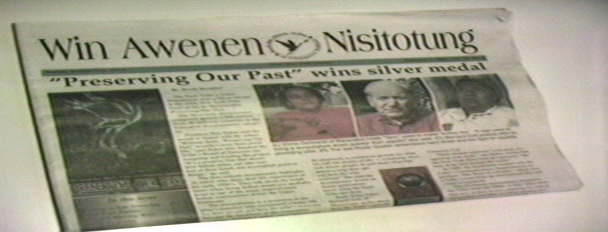

(Front Page Article from Win Awenen Nisitotung Mukwa Geezis [Bear Moon] February 1, 1999.Vol.20, No.2)
The Sault Tribe's Video Department won a silver Medal at the 1998 New York Film Festival for its documentary Preserving Our Past.
The 60-minute documentary competed against 3,500 entries from 40 different countries in the Education documentaries category.
Producer Ben Baker said the award is shared with the elders. "Without them,"Preserving Our Past" wouldn't have been possible," said Baker who thanked the Tribe's Board of Directors for assigning and funding the project. "It's a positive film that shows how Indian tribes can take control of their future and accomplish positive things," he said.
The five-volume documentary highlights 38 elders who share their life experiences in the early 1900's. They talk about the tough times when being Indian meant you probably lived in one of the many impovershed communities across the Upper Peninsula.
The documentary is a testament to the tribe's founders who envisioned a better life for their people and how the tribe's economy became the backbone of the community.
About 250 tribal elders were interviewed for the documentary. Featured elders include the late Rosie Gaskin, a well-known activist, who in the late 1960's fought to bring better education programs, more jobs and increased health care to members living along Shunk Road in Sault Ste. Marie.
She lived to see the tribe's economy grow and leave behind the poverty of the past. In a few articulate words she describes the value of preserving the Tribe's oral history:
"The vision I have is happening now," she said. "A continuous growth for economic development, a continuous growth for what we call our circle of life- a learning situation where people sit and share what happened a long time ago and how the tribe evolved." She said the documentary would let future generations know what the Sault Tribe has done.
Sault Tribe Elder, Bernard Doll of Manistique spoke about how the Tribe's growth created new opprotunities for tribal members to succeed:
"We provided jobs," he said. "We provided everyone the opportunity to better himself or their-self...you see pride in the community and the tribal unit. That's pretty darn good!"
In addition to the Silver Medal, 1998 brought "Preserving Our Past" an Award of Distinction from the 4th Annual Communicator Awards and a showing at the Twenty Third Annual American Indian Film Festival and Video Exposition in San Franscisco, Cal.
These awards represent "your peers recognizing your work," said Baker, noting that the New York Film Festival represents "the best of the best around the world."
In 1995, the department teamed with the Tribe's Communications Department to co-produce "The Story of a People," which won a Telly Award from an international film and video competition.
The 25-minute documentary chronicles the Tribe from the 1960s. A time when members met in their homes, planning for federal recognition and later investing gaming revenues to open a school, build health centers and create hundreds of jobs.
Baker said the documentary is scheduled for broadcast later this year on Minnesota and Michigan public television stations.
In 1999, the Elder project will interview elders living outside northern Michigan to expand the documentary.
To purchase copies of the documentaries ($49.99) or for information on the project call the Video Production Department at (906) 635-6513.
Win Awenen Nisitotung is published 17 times per year by the Communications Department of the Sault Ste. Marie Tribe of Chippewa Indians. Subscriptions: Regular rate, $15 per year; $10.50 for senior citizens; $22 to Canada; $32 to other foreign countries. Subscribe by sending your name and mailing address to the address below with your check or money order made out to Win Awenen Nisitotung.